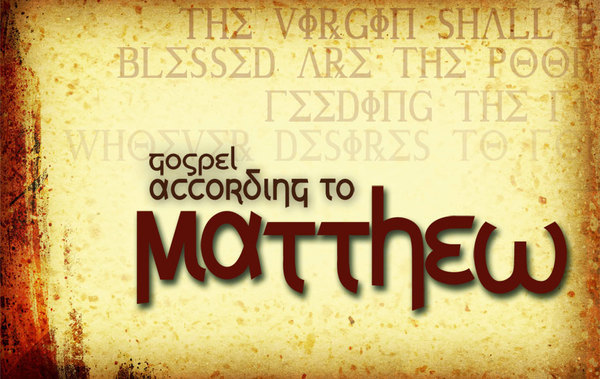Names in Matthew's Gospel
At
the end of Matthew’s Gospel, Jesus tells His disciples to place the Triune
God’s name on people in baptism. Matthew’s Gospel begins with names, also.
Matthew’s
Gospel begins with sixteen verses of genealogy. Fourteen generations of names,
many of whom we know next to nothing about. We could understand if someone
would look at that list of names and say, “So what? What does this really
have to do with my faith or my life?”
But
spend some time with those names and their meaning begins to come through a bit
more. Whom do you meet? Not just generations of fathers and sons. You meet
Abraham, a man who twice (!) lied about his wife and put her in danger to
save his own neck. A prostitute who wasn’t even part of the Jewish nation.
A king who has hand-picked by God from tending the sheep to tend his own
people, yet risked everything – even the line of the Savior – time and
again as he chased after women and glory. You meet a family of believers,
a collection of sinners, those who strove nobly and those who failed
terribly.
And
Jesus, who is called Christ, part of their family.
Who
is this God that he would become family with sinners like that?
That’s
why it’s so fitting that Matthew’s telling of Jesus’ life ends with Jesus’
words on the mountaintop.
As
Jesus sends his church out into this world, he tells us again who God is:
Father, Son and Holy Spirit. At a time when dogma and doctrine are reduced
to details for debates, distractions and divisions, we could understand if
someone heard that confession of God’s being and said, “So what? What does this
really have to do with my faith or my life?”
But
on Holy Trinity Sunday, spend some time with those names, and let their meaning
come through a bit more. This is who God is: Father, Son and Spirit
dwelling in complete unity and fellowship, even before time began. What
does that tell you about your God? By his very nature, he’s relational. By
his very nature, he craves and rejoices in fellowship. Even with a
collection of sinners.
And
then the names at the beginning of the Gospel begin to make more sense. Why
would God make himself part of a family of sinners? Because of who he is,
not who we are. By their nature, Father, Son and Spirit want nothing more
(and nothing less!) than a relationship with their creation. So he uses
his means to bring us back into a relationship with him, and sends us with
those means to bring others into his family, too. At the beginning of the
half-year of the Church, may God give us the conviction that his truths
that we study are the means to know him more fully.

Comments
Post a Comment